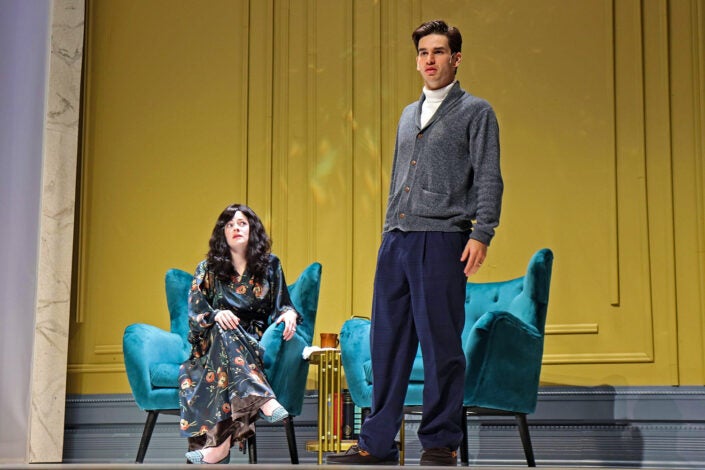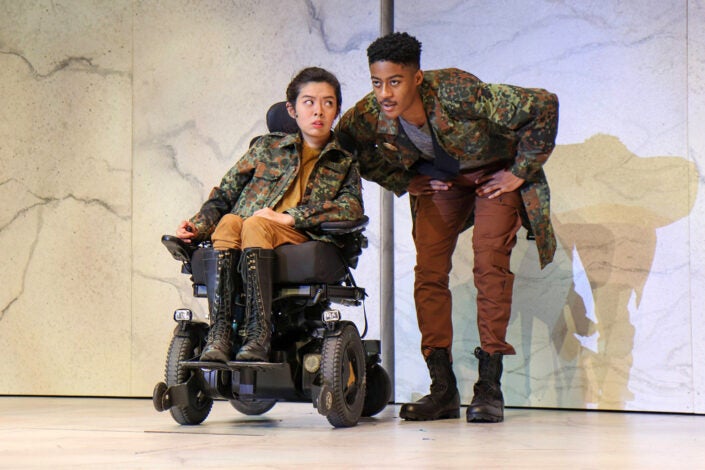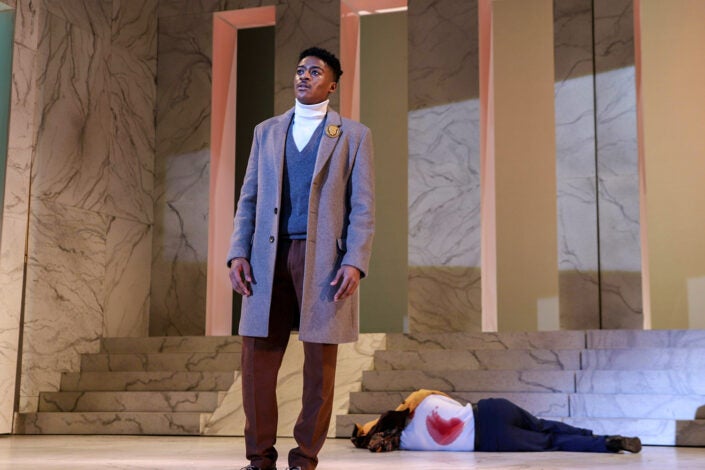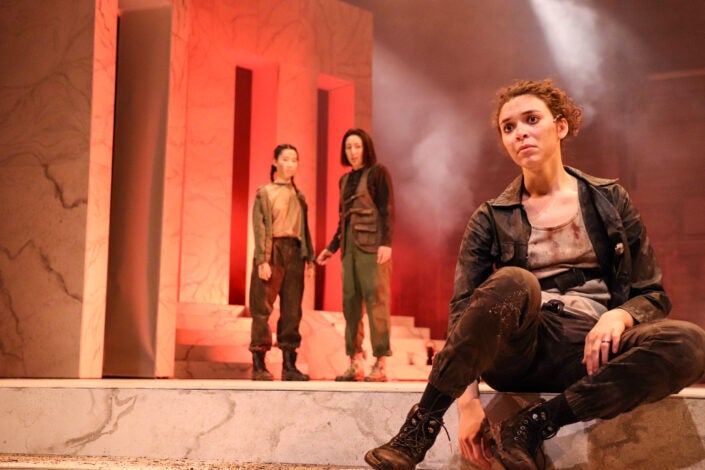Learning from Shakespeare’s Julius Caesar
Stanford frosh read, attended, and discussed William Shakespeare’s Julius Caesar as part of their COLLEGE winter course, Citizenship in the 21st Century.
For Stanford’s reimagined curriculum for first-year students, the play Julius Caesar – William Shakespeare’s tragedy about the assassination of the Roman leader and the violence that ensued – was staged as part of Citizenship in the 21st Century, the winter quarter course in Civic, Liberal, and Global Education (COLLEGE). The production – which was also open to the wider community – was the result of a new collaboration between COLLEGE and the Department of Theater & Performance Studies (TAPS).
Go to the web site to view the video.
“Julius Caesar can be read as a play about a single decision and that is: What should we do if we think someone is going to become a tyrant?” said Michael Rau, director and an assistant professor in TAPS.
The play centers around Brutus and Cassius, two Roman senators who fear the Republic will become despotic under Caesar’s rule. They believe that to save Rome, Caesar must be taken down before he becomes tyrannical in his reign. But their actions bring about what they fear most: chaos, civil war, and the demise of the Republic itself.
For students taking Citizenship in the 21st Century, the play invites them to consider the emotional messiness that comes with politics and power: It touches on ambition, loyalty, and greed. There is intrigue, speculation, fear. There are questions about justice and what is the right thing amidst uncertainty.
Julius Caesar approaches these themes in ways more traditional media cannot, said Rau.
“It’s hard to find a single document, object, or historical source that says, ‘This will allow us to think through the responsibilities, the rights, the ways in which we should consider what citizenship means,’” said Rau. “I think what is tremendously exciting about this partnership between TAPS and COLLEGE is that we use art to try to think about these issues.”
Situating Julius Caesar in the present day
In staging Julius Caesar for Stanford students, Rau wanted to give the production a modern look and feel, but without referencing a particular time or place.
The stage’s backdrop of sleek, white marble could have been any metropolitan city center; its columns were more brutalist than Doric. Attire, too, was cosmopolitan, and at times edgy, with actors wearing leather jackets over loose-fitting, neutral styles.
“The world of this play is a world that looks like our own, but isn’t ours exactly,” said Rau.
Another change was casting student actors from different backgrounds, races, and genders.

Danny Ritz (right) played the role of Julius Caesar in the TAPS production of the Bard’s tragedy about the assassination of the Roman leader. Sam Howell Petersen (left) played Caesar’s wife, Calphurnia. (Image credit: Stanford TAPS)

Marlon Washington (right) played Marc Antony and Evelyn Kuo played Octavius, who in the TAPS production was Caesar’s niece, not nephew. (Image credit: Stanford TAPS)
Women played the roles of Brutus and Cassius, but not as men: The two Roman senators were performed as female politicians. Pronouns were switched in places – Brutus was referred to as an “honorable woman” instead of “honorable man,” and the people of Rome were no longer just “sons” but “daughters” as well.
The gender switching brought a new way to understand the characters and their motivations, for both the audience and the actors who played them.
“I am playing Brutus as a woman and I think that has a lot of interesting implications for her character,” said Sierra Michelle, a sophomore majoring in communications and theater. “It’s very rare that we see female characters in positions of power – especially political power.”

Marlon Washington (left) as Marc Antony about to deliver his speech after Caesar was assassinated. (Image credit: Stanford TAPS)

Sierra Michelle played Brutus.
Michelle was also struck by what was implied by having women, instead of men, plotting to assassinate Caesar.
“It says something to have two female politicians so sick of the way things have been, so sick of the way the systems have treated them, and so sick of the way men in this world have trampled over them and not heard them, that they’ve decided to take action into their own hands,” Michelle said.
What makes Shakespeare an enduring text to stage today are its universal themes, said Marlon Washington II, a coterm pursuing a major in human biology and a master’s in community health, who played Caesar’s friend and ally, Marc Antony.
“We have these troubled people attempting to avert a constitutional crisis – which eventually topples the entire state – in ways that can resonate with contemporary politics,” said Washington. “The audience may see a world that is similar to theirs or in stark contrast to it.”
Staging Julius Caesar in the social media age
Staging the play in 2023 also meant thinking through how the characters would behave if they lived in today’s society, particularly in a world dominated by social media.
Smartphones featured throughout, starting with the opening scene when two, rowdy members of the public – “commoners,” as Shakespeare called them – were confronted by officials, who in the TAPS production were dressed as authority figures. The two commoners filmed their exchange, evocative of how members of the public turn to their mobile devices to capture interaction with people in positions of power.
When Stanford COLLEGE students discussed the play in their seminars the following week, the contemporariness of the production, particularly this digital component, was one of the first things they brought up.
“Adding a little bit of the modern aspect really helped me understand it. Sometimes when I read Shakespeare, I get lost in my thoughts because it’s not made to [look like] life and I think that element made it special,” said a student in a class co-taught by Lloyd Minor, the Carl and Elizabeth Naumann Dean of the School of Medicine, and Sara Mrsny, the associate director of COLLEGE.
Students were also struck by the novel interpretations of the characters, especially the loftiness that Danny Ritz, a senior majoring in English, brought into his performance of Julius Caesar.
Ritz said he tapped into the heavily mediated world of celebrity and entertainment news as he prepared for his part. He watched videos of contemporary political commentators – some with millions of followers on YouTube – and stars on the red carpet to see how they spoke and styled themselves in the public eye.
“Caesar is more of a persona than a person,” said Ritz. “The only time we really get to see Caesar as a person come through is in the moment that he dies. The rest is this very calculated public image.”
Ritz said he hoped that their production revealed the complexities and contradictions that the public doesn’t see or even consider when captivated by only what’s in the spotlight or on the screen.
“We live in a 24-hour news cycle where there is less room for nuance in how people view society,” Ritz said. “But nuance is a part of life. … With this play we’re making an argument for nuance and its contradictions. We can try to ignore it or we can try to wrestle with it head on, sit with it, and let it linger.”
Collaborating with COLLEGE
Parna Sengupta, associate vice provost and senior director of Stanford Introductory Studies, expressed a similar sentiment.
“Shakespeare does not lend itself to only one interpretation,” said Sengupta, who was involved in the decision to stage Julius Caesar. “The play brings out other meanings and possible interpretive conclusions. It’s hard to completely know who is the hero and who is the villain, who is right and who is wrong. This is a really important thing to get across to students: There is not just one right answer.”
The varied interpretations of the roles were brought to the fore by students in Minor and Mrsny’s class. They discussed the intensities of the characters and how some traits were dialed up and down by the actors. They also wrestled with the magnitude of what unfolded – murder – and why Brutus and Cassius didn’t consider their own abilities as senators to challenge Caesar through democratic means.
The students discussed how much of the tension in Julius Caesar stems from such contradictions and lack of clarity.
“There is no resolve,” said Washington. “Without a clear resolution, the future may appear bleak; however, we are hoping that this play, its inherent ambiguity, and our company’s artistic choices can inspire impactful conversations.”
Examining striking parallels
Before opening night, a panel of Stanford scholars from across the university – classics, performance studies, marketing, and political science – gathered to discuss what makes Julius Caesar compelling today. Moderating the discussion was Stanford Provost Persis Drell.
There was resounding consensus among the panelists about the play’s striking relevance to current political trends.
“It struck me as so painfully contemporary – it has everything we’re experiencing right now,” said Jonathan Levav, a professor of marketing. Translating the themes of Julius Caesar in today’s terms, he said: “It’s the original ‘cancel culture’ play.”
TAPS professor Jisha Menon also saw parallels with current anxieties about the rise of authoritarianism and populism and related political unrest happening globally.
Menon was also struck by how characters themselves used drama, spectacle, and emotion for political persuasion. “It’s a play within a play,” she said, adding: “Politics is so much more than just diplomacy, policy, or deliberative democracy. It is affective, dramatic, melodramatic.”
The panel also discussed how disinformation was deployed by Cassius to manipulate Brutus.
“The decision here is really in a sense corrupted from the very beginning because it’s predicated on a falsehood,” said Josiah Ober, a professor of political science.
Some two millennia later, this framing has persisted, but there is no agreement among scholars about whether Caesar had tyrannical ambitions or not, said Christopher Krebs, a professor of classics who is an expert on Caesar.
The panel discussed how the ways in which fear and fact can sometimes collide and collude with one another, distorting how people see the world and the decisions they make.
For Drell, a recurring theme that ran throughout the discussion could be articulated by one concept: narrative. “We live in a world where it feels to me, increasingly, facts don’t seem to matter as much as the quality of the narrative,” she said.
Drell is also the James and Anna Marie Spilker Professor in the School of Engineering, and a professor of materials science and engineering and of physics. Levav is the King Philanthropies Professor in the Graduate School of Business, where he is a professor of marketing. Krebs, Ober, and Menon are affiliated with the School of Humanities and Sciences, where Krebs is the Gesue and Helen Spogli Professor in Italian Studies, Ober holds the Markos & Eleni Kounalakis Chair in Honor of Constantine Mitsotakis, and Menon is also the Fisher Family Director of Stanford Global Studies.
This story is part of an ongoing, in-depth series by Stanford Report exploring the COLLEGE program.